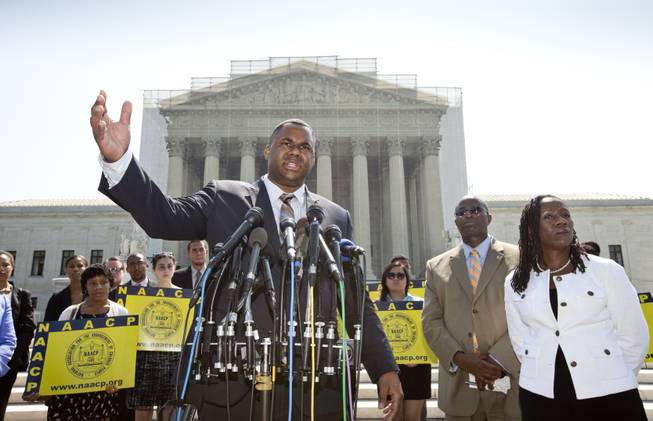
J. Scott Applewhite / AP
Ryan P. Haygood, director of the NAACP Legal Defense Fund, talks outside the Supreme Court in Washington, Tuesday, June 25, 2013, about the Shelby County v. Holder, a voting rights case in Alabama. Charles White, the national field director for the NAACP is second from right and Sherrilyn Ifill, president of the NAACP Legal Defense Fund, is at right. The Supreme Court says a key provision of the landmark Voting Rights Act cannot be enforced until Congress comes up with a new way of determining which states and localities require close federal monitoring of elections.
Wednesday, June 26, 2013 | 2 a.m.
For more
When it struck down a key provision in the Voting Rights Act on Tuesday, the Supreme Court sent Congress a challenge: If racial discrimination is still a problem at the ballot box, come up with a better law to combat it.
In the Senate, lawmakers quickly took the bait.
“The Senate will act,” Senate Majority Leader Harry Reid promised Tuesday. “It is up to Congress to right the wrong of this decision and ensure that we do not turn back the clock on America’s democratic progress.”
The Supreme Court was ruling on Shelby County v. Holder. Shelby County, Alabama, was challenging a section of the Voting Rights Act of 1965. It provided federal oversight over jurisdictions with a history of racially motivated voter suppression, requiring that the jurisdictions get federal clearance before changing any voting laws. Restoring a semblance of it is a tricky business; the standard struck down by the court has reigned for almost half a century.
“The court’s ruling is pretty hostile to the notion that Congress can select some jurisdiction as being particularly prone to racial discrimination,” said UNLV law professor Sylvia Lazos, who specializes in constitutional law and critical race theory. “Congress can try to put lipstick on that pig, and they should ... but it’s going to be very, very tough.”
Reid said Tuesday that Senate Judiciary Chairman Patrick Leahy, D-Vt., will be conducting “wide-ranging hearings” on ballot access and racial discrimination beginning next month.
“There is general displeasure — and that’s an understatement — in my caucus about what the Supreme Court did, especially in light of what happened in this last election cycle, with Republicans doing everything they could to suppress voting,” Reid added.
A major theme of the 2012 election cycle was the push for voter identification laws in states with Republican-controlled legislatures. Democrats argue such laws are a thinly veiled attempt to block minorities and the poor — constituencies that often vote Democratic — from the polls.
But while Democrats sounded that alarm, the Supreme Court read the lay of the land differently: New laws and changing societal norms since the original passage of the Voting Rights Act have answered most concerns about blatant racial discrimination at the polls, making federal oversight of certain districts unfair and superfluous.
The 5-4 decision, which split the Supreme Court’s bench neatly between Republican and Democratic-appointed justices, took specific issue with the formula used to determine which states’ ballot access policies are subject to federal approval.
“In 1965, the States could be divided into two groups: Those with a recent history of voting tests and low voter registration and turnout, and those without those characteristics,” Chief Justice John Roberts, writing for the Court. “Congress based its coverage formula on that distinction. Today the nation is no longer divided along those lines.
"Voting discrimination still exists, no one doubts that. The question is whether the act’s extraordinary measures … continue to satisfy constitutional requirements,” Roberts continued. “If Congress had started from scratch in 2006, it plainly could not have enacted the present coverage formula.”
Roberts advised Congress to “draft another formula based on current conditions.”
Congress, however, endorsed those older conditions, in its 2006 reauthorization of the Voting Rights Act, which passed the Senate by a vote of 98 to 0, and the House of Representatives by 390 to 33. The current law wouldn't have expired until 2031.
In his amicus brief, Reid addressed the logic he had hoped would prevent the Supreme Court from declaring the Voting Right Act formula a relic: If the law is working as it should, the court has no business telling Congress to get rid of it. Now, it may be far more difficult for Congress to come up with a new way of determining when the federal government can step in to keep states and counties from running afoul of racial discrimination laws.
“The Court has come up with this standard that if something is racially tinged, it’s unconstitutional, but if it’s just about politics, it’s not,” Lazos explained. “Having voter ID laws, not having Sunday voting … that goes to the heart of the black community. Those are the modern forms of voter suppression … but it’s much more subtle.”
There is also the complicating factor of political and racial overlap, Lazos explained. In states such as Nevada, where about 90 percent of the black population and 70 percent of Hispanics vote Democratic, are efforts such as gerrymandering districts along racial lines discrimination, or just the basic one-upmanship of a two-party system clawing for influence?
And if it’s now up to Congress to decide the answer to that question, why would lawmakers vote to discredit the system that helped them win congressional office?
“The old history gave the representatives of Congress cover to reauthorize the Voting Rights Act,” Lazos said. “Now what the court is basically saying to Congress is find new offenses, find more modern evidence and then have your own representatives (who may have benefited from them) vote to support that added scrutiny. … It’s a much, much tougher vote.”
Reid did not say when he expected Leahy’s hearings to produce legislation for the Senate to vote on.


Join the Discussion:
Check this out for a full explanation of our conversion to the LiveFyre commenting system and instructions on how to sign up for an account.
Full comments policy